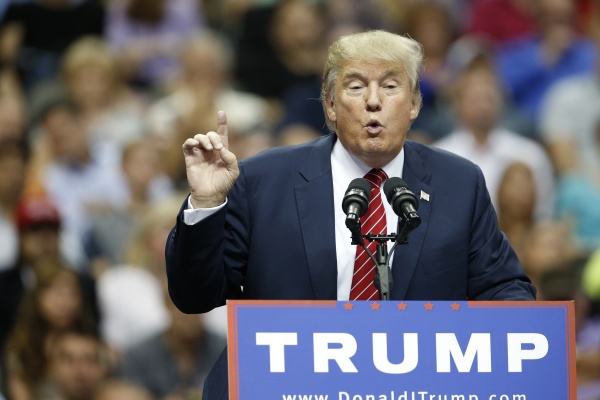Donald Trump: Master of Distraction
TNS
Republican presidential candidate Donald Trump speaks at American Airlines Center in Dallas on Monday, Sept. 14, 2015. (Nathan Hunsinger/Dallas Morning News/TNS)
November 22, 2015
As anyone who has watched any mainstream news channel for even a minute in the past three months knows, Donald Trump is no fan of undocumented immigrants. His blustery, seemingly written-on-the-spot stump speeches get that message across with such divisive rhetoric as this comment from his introductory campaign address: “When Mexico sends its people, they’re not sending their best…They’re bringing drugs. They’re bringing crime. They’re rapists…and some I assume are good people.”
Despite the racism and intolerance expressed in his public remarks, Trump has been at the head of the vast majority of Republican polls since July. Many have rushed to dismiss Trump as a consequence of powerful right-wing special interests unique to the unusually conservative political climate present in the United States. But Trump’s rise to power is not an isolated incident. It mirrors a larger trend of rising nationalistic antagonism toward migrant workers and refugees. Across Europe, far-right parties have come to the forefront on a continent-wide scale, decrying immigration, multiculturalism and “political correctness.” For all of their emphasis on jingoism and rejection of internationalism, Donald Trump and the European “new right” have very much in common. To see the common role of the inexorable forces on each side of the Atlantic, we have to look at the manner in which the main movement of the 20th-century far right, fascism, has served as a divisive force on its own.
The key component of traditional fascism is that it uses intense nationalism and xenophobia as a means of distracting the working class from its real enemy. In times of capitalist crisis—such as the post-World War I depression and the 2008 financial meltdown— reactionary movements come to the forefront as a means of redirecting the righteous fury of those by an economic system only designed to benefit a tiny portion of the population. It was for this reason that the NSDAP received the financial backing of German aristocrats and industrialists who saw him as the only thing that could save their wealth and privilege from the rise of the German Communist Party. These movements often take on the mantle of being anti-establishment, yet they simultaneously reinforce the standards of traditionalist hierarchies and private property. The goal is to take resentment that could be directed toward inequality and exploitation, and instead see to it that it is aimed squarely at a racial or ethnic scapegoat.
Marine Le Pen, leader of the French National Front party, was made to stand trial for hate speech after comparing public prayer of Muslims to the Nazi occupation of Vichy France. For Hungary’s reactionary Jobbik, the blame falls predominantly on the Roma people—derogatorily referred to as “Gypsies”—who have repeatedly been the victims of ethnically-motivated violence at the hands of party members. Greece’s Golden Dawn—whose leader is quite fond of Germany’s most infamous head of state and whose members of parliament have cheerfully embraced the Nazi salute as an expression of their political identity—tends to demonize Turkish migrant workers (when not busying itself with fervent Holocaust denial). All of these parties have seen groundswells of support and possess large reservoirs of loyal devotees. Jobbik is the third-largest party in the Hungarian General Assembly, gaining 20 percent of the vote in the 2014 General Election. Golden Dawn holds 21 seats in the Greek Parliament. Le Pen currently stands as the frontrunner for the next French presidential election, with almost double the support of the third-place incumbent. Trump, for whom impoverished Mexican “braceros” are the enemy, currently stands as the frontrunner in the race for the Republican presidential candidacy.
With his campaign message of division and intolerance, Trump places himself in the company of these bottom feeders who manipulate the working class through rhetoric that brings out the very worst and most primeval in their legions of supporters. None of this is said to imply that Trump is an anti-Semite, a fascist or a Nazi sympathizer as some parties of the European right are, but it does illustrate the dangers of this exclusionary line of prejudiced xenophobia. It cannot be disputed that, like the far-right parties of “New Europe,” Trump employs bigotry, ignorance and racism out of sheer opportunism and arrogance—and that is something far more dangerous than he ever could imagine.












